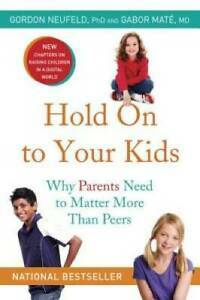You need to sign in or sign up before continuing.
Take a photo of a barcode or cover
198 reviews for:
Hold On to Your Kids: Why Parents Need to Matter More Than Peers
Gabor Maté, Gordon Neufeld
198 reviews for:
Hold On to Your Kids: Why Parents Need to Matter More Than Peers
Gabor Maté, Gordon Neufeld
I keep putting off reviewing this because it's too daunting.
This book has been on my Kindle forever, at the recommendation of a primarily foster/adoptive parenting group. I started it back when I got it and put it down pretty quickly -- it didn't seem like it was for me. Unfortunately, a lot of the language used sets off some fundamentalist/evangelical bells in my head, and I think it will for others with that type of background. I don't think it necessarily is meant to in this context, but it's something to be aware of and from the other side, I would say that it's worth pushing through if you can.
Quarantine put me in the perfect place to push through. I kept seeing this book recommended, and at the same time I've found myself frustrated, annoyed and confused by so much of the discussion of kids missing their friends and play dates and social outings during quarantine. I totally respect and understand that for older kids. But as a mom of still pretty young kids, it didn't resonate at all. It didn't resonate with my kids the way they are, and it didn't resonate with myself as I remembered feeling when I was a young child. I had some friends I enjoyed playing with, but at that age, my world didn't revolve around them. I also felt like the emphasis on social get togethers for young kids was weird and misplaced, but didn't fully have words for it.
So I picked this book up again, because I thought it would put words to that. And did it ever.
Unfortunately sometimes the words are off-putting. It's hard to keep them in the context of this book alone and remove all of the external baggage, in order to actually read what the author intended. But apart from that, and viewed through the context of "this is what a deficit in secure attachment looks like" -- which is what the book is really describing -- it is absolutely stunning. It describes pieces of things I hadn't yet been able to explain or understand. It validates a lot of my intuition, which is that the focus on "friends" for young children who still desperately need to form secure attachments to caretakers is weird. It explained why I could trust my dog to stay near me but not my children.
There were some missteps -- a lot of it feels dated, or maybe that's because I feel like kids today are more hopeful and promising than we give them credit for -- but underneath some of the cultural things that irritated me I was highlighting nonstop, because it was JUST. SO. ACCURATE. and explanatory in working through specific results and symptoms of attachment challenges.
This book has been on my Kindle forever, at the recommendation of a primarily foster/adoptive parenting group. I started it back when I got it and put it down pretty quickly -- it didn't seem like it was for me. Unfortunately, a lot of the language used sets off some fundamentalist/evangelical bells in my head, and I think it will for others with that type of background. I don't think it necessarily is meant to in this context, but it's something to be aware of and from the other side, I would say that it's worth pushing through if you can.
Quarantine put me in the perfect place to push through. I kept seeing this book recommended, and at the same time I've found myself frustrated, annoyed and confused by so much of the discussion of kids missing their friends and play dates and social outings during quarantine. I totally respect and understand that for older kids. But as a mom of still pretty young kids, it didn't resonate at all. It didn't resonate with my kids the way they are, and it didn't resonate with myself as I remembered feeling when I was a young child. I had some friends I enjoyed playing with, but at that age, my world didn't revolve around them. I also felt like the emphasis on social get togethers for young kids was weird and misplaced, but didn't fully have words for it.
So I picked this book up again, because I thought it would put words to that. And did it ever.
Unfortunately sometimes the words are off-putting. It's hard to keep them in the context of this book alone and remove all of the external baggage, in order to actually read what the author intended. But apart from that, and viewed through the context of "this is what a deficit in secure attachment looks like" -- which is what the book is really describing -- it is absolutely stunning. It describes pieces of things I hadn't yet been able to explain or understand. It validates a lot of my intuition, which is that the focus on "friends" for young children who still desperately need to form secure attachments to caretakers is weird. It explained why I could trust my dog to stay near me but not my children.
There were some missteps -- a lot of it feels dated, or maybe that's because I feel like kids today are more hopeful and promising than we give them credit for -- but underneath some of the cultural things that irritated me I was highlighting nonstop, because it was JUST. SO. ACCURATE. and explanatory in working through specific results and symptoms of attachment challenges.
I’m glad I read this book, I liked the approach to think of parenting as a relationship and to always “collect “ our children and build attachment. However there is a lot of certainty bordering on preaching without enough evidence presented to support the claims made.
informative
medium-paced
Listened to this on via audiobook. This book touches on the the connection based relationships of our children and whether their emphasis is on peer-orientation or parent/adult-orientation. The draw is to keep the honor and respect of our children by being intentional when it comes to connection and love, which will in turn help our children to feel loved, valued, and confident in their sense of self and individuality. If they are unable to have such a connection relationship with their parents, kids will seek the comfort and affirmation or acceptance from their peers, potentially losing their individuality and confidence in sense of self in the process.
As a connection based parent myself, I found the psychology behind this interesting. 4ish stars because I don’t agree with everything in the book but felt it was worth the read/listen. Especially if you are considering homeschooling. This perspective may convince or validate that desire for you.
informative
reflective
slow-paced
There were some good ideas in this and it did leave me motivated to do better in connecting with my kids, especially during times of discipline. However, I felt it was much too long, especially the first section (more than half the book) that is selling us on the problem. If that part had been one chapter and the rest of the book was the same, I probably would have rated it four or five stars.
challenging
informative
inspiring
medium-paced
informative
reflective
slow-paced
Overall the message of this book is an important one for all parents or caregivers, I'm glad I read it.
I have some nit picks about how neurodivergent kids are talked about and a couple of other one-off comments that rubbed me the wrong way in the beginning of the book.
If you are considering reading this I do recommend it!
Make sure you get a new edition, it talks more about the struggle with tech/social media and the pandemic
I have some nit picks about how neurodivergent kids are talked about and a couple of other one-off comments that rubbed me the wrong way in the beginning of the book.
If you are considering reading this I do recommend it!
Make sure you get a new edition, it talks more about the struggle with tech/social media and the pandemic
I found myself really ambivalent about this book. While I found myself nodding in agreement about some of the ways in which American parenting has gone wrong and lost perspective, I also found the complete disavowal of peer relationships to be a bit absurd. I did like some of the suggestions for "positive discipline" at the end and the way in which such suggestions are rooted in the repair of connection first and foremost, but overall I found myself feeling a little antagonistic to the book. But maybe that's just my inner peer-oriented teenager coming out. Disappointing.
challenging
informative
slow-paced




